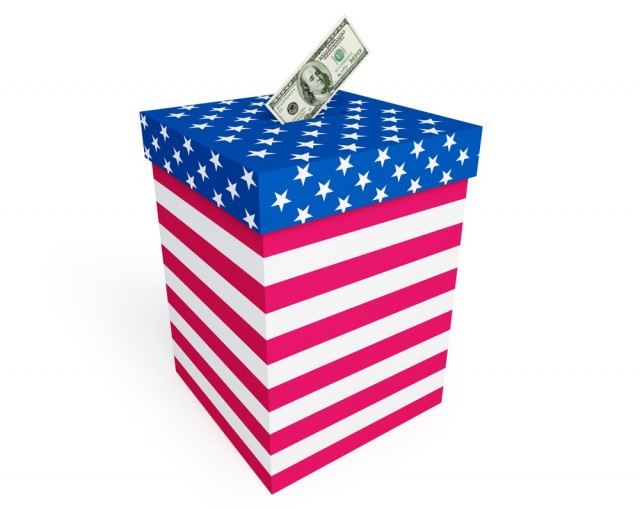
No matter the issue, the debate in this year’s presidential election is all about money: about the national debt, about how much we spend on entitlements, on the high finance world of private equity and Wall Street, and about campaign donations and spending. In advance of Zócalo’s first Bakersfield event, “How Much Does It Cost to Become President?”, co-presented by Cal Humanities, we asked experts on presidential politics about the increase in donations to presidential campaigns both by the wealthy giving millions to Super PACs and by average folks giving $5 online. What’s good and what’s bad about these trends?

More people participating in elections by making small contributions to candidates strengthens the democratic process. It signals that larger numbers of citizens care about the policies of the government and feel that their participation can have some effect on the election outcome. But when a very small number of wealthy individuals make huge campaign donations, the impact is quite the opposite. At least since the Watergate corruption scandals, most Americans have recognized the need for reasonable limits on campaign contributions—to prevent donations that are so large as to be potentially corrupting. A $5 donation is going to be appreciated by a candidate but it won’t buy special favors; a $1 million donation very likely will. More than eight in 10 Americans in a recent poll by The Associated Press and the National Constitution Center supported limits on the amount of money given to groups that are trying to influence U.S. elections. As of last month, 60 percent of the money received by super PACs came from just 100 people. The potential of a very small number of elite donors to super PACs to buy the attention and special treatment of the favored presidential candidate is huge—and enormously dangerous. These millionaires and billionaires have their own interests at stake, and now with unlimited donations to super PACs closely aligned with the presidential candidates, these 100 people are largely determining what the candidates talk about. Some, like casino magnate Sheldon Adelson, whose business practices are under investigation by the Department of Justice, may want something even more specific in return. Not only are very large donations potentially corrupting, they are disheartening. The question above assumes more people are making donations today. That does not appear to be the case anymore since the Citizens United decision. While Obama did indeed rally unprecedented numbers of small contributors in 2008 when we still had limits on donations, today’s new Wild West era of super PACs and unlimited donations appears to have sharply reversed that trend. Yesterday’s wave of $5 online donors has receded as the small donors are re-thinking whether their $5 makes any difference under the crush of today’s mega-donors.
Dr. Craig Holman is currently Government Affairs Lobbyist for Public Citizen. He serves as the organization’s lobbyist on campaign finance and governmental ethics. Previously, Holman was Senior Policy Analyst at the Brennan Center for Justice, New York University School of Law.

“One person, one vote” is a bedrock of our democracy. From the beginning, this nation explicitly rejected the plutocracy the Founding Fathers knew so well. That each citizen’s vote counts the same as any other citizen’s—regardless of wealth or social status—remains an ideal that continues to inspire around the world, even when we fall short. Certainly our currently campaign finance system falls short. And the U.S. Supreme Court’s Citizens United decision made the situation infinitely worse by overturning more than 100 years of campaign finance law and regulation. Now corporations can use their treasury funds, sometimes amounting to billions of dollars, to make direct expenditures to influence elections. The growth in small-dollar giving via the Internet is encouraging, but doesn’t threaten the domination of this system by the wealthy elite. Fewer than 200 individuals have funded 80 percent of Super PAC spending, and the well-heeled interests are funneling millions to “dark money” groups like Crossroads GPS or Priorities USA. Contrast that with the fact that only 0.26 percent of all Americans—yes, that’s one-quarter of one percent—contribute more than $200 to federal elections. Meaningful reform would provide new incentives in the system for candidates to pursue, and for citizens to give, small dollar donations. U.S. Representatives David Price (D-NC) and Chris Van Hollen (D-MD) have introduced just such a bill in Congress. Passage should be a priority for the 113th Congress. Without these changes, Washington will continue to work according to a familiar maxim: “He who pays the piper calls the tune.”
Meredith McGehee serves as Policy Director at the Campaign Legal Center where she directs the legislative and media policy efforts. She also is the principal of McGehee Strategies, which specializes in public interest advocacy campaigns.

Money talks in political campaigns, particularly in the highest visibility campaign of all, the presidential campaign. Decades ago our nation’s highest court found that money spent in political campaigns is essentially equivalent to speech, and that money given to candidates, political parties, or outside groups (such as PACs and Super PACs) is akin to speech by proxy—meaning it becomes speech when it is spent by the recipient of that contribution. The Supreme Court has found that when we give political contributions we are expressing our general support for a candidate. In our society, we often use political campaign contributions as a proxy for civic involvement. From that perspective, one could argue that an increase in the number of donors equals an increase in the number of people taking part in the political process. One could claim that more contributors means more people who are engaged in the political process and want to voice their support for their chosen candidate. This view is consistent with the Supreme Court’s perspective on campaign finance issues. On the other hand, one may contend money is not given simply as a way to voice support for candidates and issues, but rather as way to curry favor, obtain the ear of a candidate, and maybe get something in return. Under this view, a political contribution is less about speaking and more about ensuring a spot at the bargaining table. In this scenario money serves a business purpose and may, in some instances, give rise to actual or apparent corruption. People and entities that give to both major candidates fall into this category. Whether money is used as a way to endorse a candidate or as an attempt to ensure that one’s interests are taken into account, the amount of money spent in political campaigns, and particularly presidential campaigns, presents serious problems. Chief among these problems may be the appearance that politics is a game for those with the ability and desire to spend money.
Jessica A. Levinson is an associate clinical professor of law at Loyola Law School where her research focuses on election laws and governance issues. She is the author of the articles “We the Corporations? The Constitutionality of Limitations on Corporate Electoral Speech After Citizens United,” and “Timing is Everything: A New Model for Countering Corruption Without Silencing Speech,” and the upcoming article entitled “When Less is More: Limiting Political Spending to Promote Political Speech.”

Super PACs loom large on the political landscape. Such groups, while legally prohibited from giving explicit support to any political candidate, have had a major effect on the 2012 presidential race. During this year’s Republican primaries, super PACs got a great deal of attention—and rightly so. Casino magnate Sheldon Adelson donated several million dollars to pro-Newt Gingrich super PACs, breathing life into Gingrich’s candidacy and extending the campaign for the Republican nomination likely beyond its natural life. In this new era of campaign finance, the question about Super PACS is their effects. Most voters seem to think super PACs are bad for politics; a Pew poll from January 2012 showed that 65 percent of registered voters believed that the U.S. Supreme Court’s Citizens United decision—and the resulting rise of super PACs—was having a negative impact on the presidential race. This is likely because super PACs are often portrayed as groups that give more political influence to the wealthy. At the same time, with the Internet becoming increasingly important in the campaign finance world, the barriers to making political donations have lowered for the average American. Microdonations—donations under $200—are becoming common. According to the Campaign Finance Institute, in 2008, Barack Obama raised 34 percent of his total $337 million from donors who gave less than $200 to his general election campaign. And even though many think of super PACs as bastions of the rich, super PACs are also seeing significant small donor participation. Open Secrets reports that the conservative Restore America super PAC collected $1.6 million between July and September—85 percent of which came from donors giving less than $200. The current state of campaign finance in the United States may provoke a good deal of argument about whether the system is good or bad for politics, but without a doubt, the campaign finance system is enabling more people—wealthy and working-class alike—to get involved in funding campaigns.
Jennifer Marsico is a Senior Research Associate at the American Enterprise Institute.
Mark Schmitt
With matches and incentives, growth in small donors can be harnessed to limit the problems of big donors

Money in American politics always produces numbers that have the power to shock. But rarely are the numbers genuinely surprising. An exception was the news that more than four million people have contributed to the Obama campaign in 2012, up from three million in 2008. Congressional candidates of both parties boast comparable numbers. This is an extraordinary change, driven in part by the Internet, which reduced the cost to campaigns of pursuing small donors. In 2000, according to estimates from the Campaign Finance Institute, only 625,000 small donors contributed to any presidential candidate. This change is not only good in itself—because elected officials will be less dependent on a few large donors, and because more candidates have a chance to run competitive races—but also because it points to possible solutions to the influence of big money and SuperPACs. Systems that encourage small donors—such as through tax credits or matches like New York City’s six-to-one match on contributions under $175—further encourage campaigns to seek funding from the same kinds of people they are seeking votes from, and dramatically reduce the influence of the bigger donors and outside spending. All this can be done without changing the Supreme Court’s Citizens United decision. We can use one of the best things to happen in recent American politics to counter one of the worst.
Mark Schmitt, former executive editor of The American Prospect, is a senior fellow at the Roosevelt Institute and a senior research fellow at the New America Foundation.

The CEO of Worldwide Acme Corporation and Joe Schmo from Ohio give to politicians for the same reason: They think their guy is going to get them something they want. What they want might be selfish (a tax break or a subsidy that benefits them directly) or it might be altruistic (more immigrant visas or transfers to the poor). But more and more people think it’s worthwhile to drop some dough in the pockets of politicos because office holders have more and more power every year. Government continues to grow in size and scope, which means legislators, presidents, and city councilmen have more money to give away, more contracts to dole out, and more tax advantages to confer. Rather than putting people and companies in a position where they believe they have to support (or buy) a public official to get what they want, I’d rather see a scenario where government is smaller and people have to figure out other ways to spend their money to change the world.
Katherine Mangu-Ward is managing editor of Reason magazine.

Most Americans who contribute to the presidential campaign are making the kind of $20 or $50 contributions that average folks can afford, and that’s a good thing. Voting is only one way to make our political voices heard, and joining together with other citizens to support candidates and issue organizations is an important part of our democracy. We should create policies that encourage even more non-wealthy citizens to get in the act—like matching small contributions with public funds, or providing tax credits or coupons for small gifts. But, despite increasing participation by small donors, U.S. elections are becoming even more dominated by a few special interests and wealthy individuals—and this flies in the face of our shared value of political equality. Candidates have long depended upon $1,000+ gifts from a tiny minority of well-heeled donors for the majority of their funds. Despite President Obama’s impressive small-donor fundraising, nearly half of his 2008 campaign funds came in contributions of at least $1,000, and only about a quarter came from the millions of people giving $200 or less. Then, in 2010, the Supreme Court’s infamous Citizens United decision allowed direct corporate spending on elections and cleared the way for Super PACs and other “outside spending” groups to gather and spend unlimited funds. This gave the wealthy even more clout. Just 47 people giving at least $1 million accounted for 57 percent of 2012 Super PAC fundraising through June, for example. This matters because the wealthy don’t live, work, or think like the rest of us—so their outsized power distorts policy outcomes. Lax candidate contribution limits, combined with unlimited giving to outside groups, has created a democracy in which the strength of a citizen’s voice depends upon the size of her wallet. The good news is that the vast majority of Americans support strong measures to build a truly equal democracy—from the small-donor incentives mentioned above to more fundamental changes such as amending the constitution to give Congress and the states the power to rein in big money. Now it’s time to get to work.
Adam Lioz is Counsel for Demos, where he conducts litigation, research, and policy analysis on voting and democracy issues.



